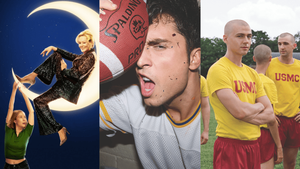* This is the fourth article in The Advocate's continuing coverage of four battleground states: Colorado, Florida, Virginia, and Ohio.
In one of my earliest political memories, I'm marching around my grandparents' house with my homemade "Clinton for President" sign while watching the 1992 Democratic National Convention on television. As staunch Republicans, my grandparents were certainly baffled by their grandson, who knew little about politics at the time but who clearly was leaning toward the opposite end of their position on the political spectrum.
Never in my wildest dreams did I expect to be so actively involved in the planning of the 2008 Democratic National Convention in Denver. In fact, over a year ago I sat in a stuffy Capitol Hill cafeteria weighing the pros and cons of working for congresswoman Diana DeGette as her deputy chief of staff and communications director. She represented Denver and would become the congressional host of the 2008 convention. And that was the clincher -- by signing on with Ms. DeGette, I would have the opportunity to work on the convention. Being gay played no role in my decision, but I would soon find out that being gay presented me with a one-of-a-kind opportunity representing her on the Executive Host Committee.
We all know a lot about the 2008 Democratic National Convention in Denver. We know it was truly successful on every level, particularly for the LGBT community, whose presence this year far exceeded that of previous conventions. We saw LGBT delegates represented at almost every event; we saw a sea of rainbow flags; we saw Michelle Obama attend the official LGBT luncheon; and we saw scores of delegates and supporters attend the Human Rights Campaign's Rock to Win concert. The LGBT community was not only included, but visible to a degree never seen before.
What you may not know is that, for months leading up to that historic week in late August in which Barack Obama became the Democratic nominee, rank-and-file members of the LGBT community were hard at work planning a diverse and inclusive convention -- not just for their own community, but for the Democratic community at large. Those working on this year's convention included members of the African-American, Latino, and Asian communities, and gays and lesbians were also represented at the highest levels of convention planning in Denver. My personal story is no different -- it's peppered with so many eye-opening experiences that have now made me a stronger professional because of my unique vantage point working on the convention.
Immediately after moving to Denver, I was thrown into the center of the preparations for the thousands to descend on the city. It was all hands on deck -- whether it was designing the logistics for delegates to maneuver around the city, making our fund-raising targets, or talking up convention planning with local and national reporters, I was ready and willing to make this convention a success like everyone else.
As I represented Representative DeGette around that big oval table in the center of the mayor's office for our weekly Executive Committee meetings, I not only felt welcomed to express my perspective but was expected to speak up. Whether it was discussing event preparations with the mayor of Denver or financial goals with Colorado's soon-to-be senior senator or ticket distribution with the Obama campaign, regardless of who I was, those planning the Denver convention gave me a seat -- a front seat -- at the table.
It was, however, also important to me that LGBT Americans unable to come to Denver felt empowered by this convention. Working with the Human Rights Campaign, I made certain there was an LGBT media liaison working alongside convention media operations so that those across America could feel like they were on top of the news that affected our community. All in our community, whether in Denver or Seattle or Jacksonville, had a stake in what began in Denver.
We learned from 2004 exit polls that LGBT Americans represented 4% to 6% of the electorate, a crucial number that could decide the outcome of the 2008 contest in a number of battleground states, including Colorado, New Mexico, and even Virginia. LGBT Americans could tip the scales come this November.
The great thing about working on the 2008 Democratic National Convention was whether you were a communications director for a member of Congress like myself, or the chief technology officer for the Democratic National Convention Committee, or even the deputy campaign manager for our party's nominee, as LGBT Americans we all had an important role in making this convention a success, not only for our community but for the entire Democratic community.
As a gay man, the openness and inclusiveness that I felt working on the 2008 convention in Denver is truly emblematic of the Democratic Party I chose to root for in my grandparents' living room. And now, as someone who knows a great deal more about politics, I understand why.




































































Charlie Kirk DID say stoning gay people was the 'perfect law' — and these other heinous quotes